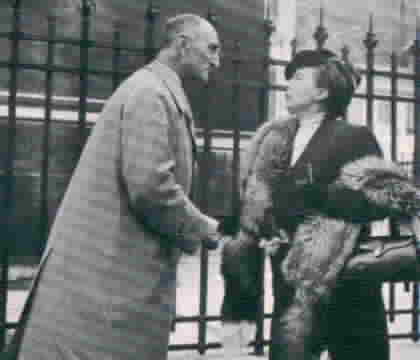
BOW

If you come up too quickly, it won't seem like you are really apologizing. --Yamagishi (Sugawara 1996)
Posture. To bend, curl, or curve the upper body and head forward.
Usage: Around the world, people bow a. to greet, b. to defer, c. to show courtesy, and d. to pray.
In some cultures the bow is a formal gesture, as in Japan, e.g., where people are judged by their bows. A
casual hello to Japanese colleagues is a quick bend to a 15-degree angle; a respectful greeting to customers
or superiors is a 30-degree bow; a formal apology involves a quick bend to a 45-degree angle,
held to a count of three, with a slow return to upright posture.
Anatomy. Bowing the trunk forward starts with flexor muscles of the stomach's recti abdominis,
assisted by the backbone's erector spinae. These muscle groups are supplied directly by spinal
nerves rather than by more evolved nerve plexuses. The bow's submissive tone stems from the
role these muscles and nerves originally played in curling the head and trunk forward into a
protective crouch. (Sudden head-lowering and back-rounding in response to an employer's
remarks thus reveals weak or "spineless" resignation.)
Baseball. In Japanese baseball, pitchers remove their caps and bow toward home plate after hitting a batter with a ball.
Culture. 1. In Japan, the forwardness of one's bow reflects status; e.g., those higher in status bow less deeply to those lower in status. It is considered bad form for westerners to bow too deeply to lower status Japanese. 2. Among the Mossi of Burkina Faso, the most servile gesture is the poussi-poussi. "To poussi-poussi, Collett [1983] explains, one takes off shoes and headgear (which add height), sits with the legs 'tucked to one side,' lowers the body, and beats on the ground. (Historically, men also threw dust on their heads.)" (Givens 1986:155 ). 3. "In the Muslim world, the body kowtow--in which one kneels down and touches the ground with the forehead--is used in prayer to show humility before the deity (Morris 1994:11).
Humility. The English word humble means being "close to the ground." It comes via Old French's umble from Latin's humilis, "low, lowly." The word derives from Latin's humus, "earth," and is related to the English word human. In its original sense, being human meant being an "earthly being," as opposed to being an ethereal, immortal god in the sky (Ayto 1990). The Indo-European root for man is *dhghom, for on the ground is *dhghm, and for earth is *dhghom-o (Susan N. Skomal, personal communication).
Submission. Bowing at the boss's door is a common act inspired by the reptilian brain. Before
entering a superior's inner sanctum, American workers may pause, bend at the waist, flex their
necks forward, and lower their heads to peek in. Though without a formal tradition of bowing,
they ritually lower themselves at the boss's door, as if doing so were written into the job
description.
RESEARCH REPORTS: 1. Bonnet macaques bow heads in extreme fear (Rahaman and Parthasarathy 1968). 2. Bowing (Eibl-Eibesfeldt 1970), bent-forward (Scheflen 1972), and body-kowtow (Morris 1994) postures involve forward bending (ventral flexion) of the spinal column; each of these nonverbal cues makes its submissive appeal by showing harmlessness.
Antonyms--ANTIGRAVITY SIGN, HIGH-STAND DISPLAY. See also BODY WALL.
Copyright 1999, 2000 (David B. Givens/Center for Nonverbal Studies)